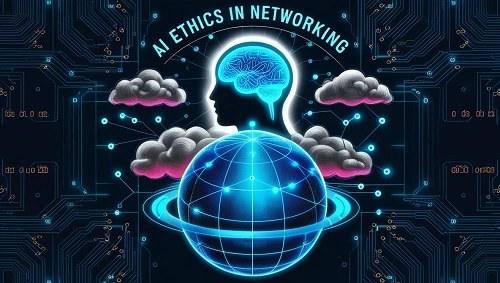In the rapidly evolving landscape of artificial intelligence (AI), the integration of AI into networking technologies has become a focal point for innovation and efficiency. However, with these advancements come significant ethical challenges that must be addressed to ensure that AI-driven networking remains a force for good. The recent article by ITWeb, *AI Ethics in Networking*, sheds light on these ethical concerns and the imperative for a robust framework to guide the ethical use of AI in this domain.
The Dual-edged Sword of AI in Networking
AI has revolutionized networking by automating complex tasks, enhancing security, and improving decision-making processes. For instance, AI can predict network failures before they happen, optimize traffic flow, and even detect cyber threats in real-time. These capabilities are invaluable in a world where the volume of data and the complexity of networks are growing exponentially.
However, the very power that makes AI so valuable in networking also poses ethical dilemmas. The automation of decision-making processes can lead to a lack of transparency, where decisions made by AI are not fully understood by humans. This “black box” problem is particularly concerning in networking, where the stakes are high, and the consequences of errors can be significant.
Privacy and Surveillance: The Ethical Quagmire
One of the most pressing ethical issues in AI-driven networking is privacy. As networks become more intelligent and capable of processing vast amounts of data, the potential for surveillance increases. AI can monitor network traffic, analyze user behavior, and even predict user actions. While these capabilities can improve network efficiency and security, they also raise serious concerns about privacy and the potential for abuse.
For example, AI’s ability to analyze network traffic in real-time can be a powerful tool for detecting and preventing cyberattacks. However, the same technology can be used to monitor individuals’ online activities, raising questions about the balance between security and privacy. This is especially critical in environments where sensitive data, such as personal information or confidential business communications, is transmitted.
Bias and Fairness: Ensuring Equality in AI Decisions
Another significant ethical challenge in AI networking is the issue of bias. AI systems are only as good as the data they are trained on, and if the training data contains biases, the AI will inevitably reflect those biases in its decisions. This can lead to unfair treatment of certain users or groups, perpetuating inequality and discrimination.
For instance, if an AI system used in networking is trained on data that reflects historical biases, it may unfairly prioritize traffic for certain users while disadvantaging others. This can have serious implications in scenarios where network access is critical, such as in education, healthcare, or emergency services.
To address these concerns, it is essential to ensure that AI systems are trained on diverse and representative data sets. Moreover, there must be mechanisms in place to regularly audit AI decisions and correct any biases that may emerge.
Accountability and Transparency: Building Trust in AI
For AI in networking to be ethically sound, there must be clear accountability for AI decisions. This includes ensuring that there is always a human in the loop who can understand, explain, and, if necessary, override AI decisions. Transparency is also crucial; users need to know how AI systems are making decisions that affect them, and they should have the ability to challenge those decisions if they are unfair.
This is particularly important in scenarios where AI-driven networking is used in critical infrastructure, such as telecommunications, power grids, or financial systems. In these cases, the consequences of an AI error could be catastrophic, making it essential that there are robust systems in place for monitoring and controlling AI behavior.
The Path Forward: Ethical Frameworks for AI in Networking
To navigate the ethical challenges of AI in networking, it is essential to develop comprehensive ethical frameworks that guide the design, deployment, and operation of AI systems. These frameworks should be built on the principles of fairness, accountability, transparency, and respect for privacy.
Moreover, there should be an ongoing dialogue between technologists, ethicists, policymakers, and the public to ensure that AI in networking evolves in a way that is aligned with societal values. This includes the development of regulations and standards that enforce ethical practices in AI development and deployment.
In conclusion, while AI offers tremendous potential to transform networking, it also brings with it significant ethical challenges that must be carefully managed. By adopting ethical frameworks and fostering a culture of accountability and transparency, we can harness the power of AI in networking while ensuring that it serves the best interests of all.







